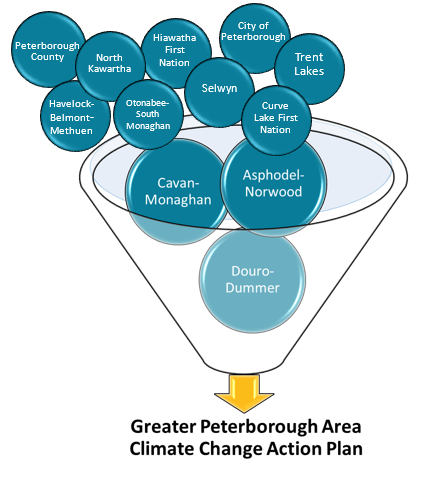What is the Greater Peterborough Area Climate Change Action Plan?
Sustainable Peterborough has developed a Climate Change Action Plan (CCAP) for the Greater Peterborough Area (GPA). The overall objective of the CCAP is to reduce our greenhouse gas (GHG) emissions, reduce the use of fossil fuels, lower our energy consumption, and adapt to our changing climate. The plan has identified goals, actions, and emissions reduction targets that fit with and address the unique needs of each Municipal and First Nation partner.
What is the Partners for Climate Protection Program?
Partners for Climate Protection (PCP) Program is a commitment by local governments to reduce GHG emissions and act on climate change. Administered by the Federation of Canadian Municipalities (FCM), the program has over 225 local and regional governments participating. As a Priority Action of the Sustainable Peterborough Plan, each Municipal and First Nation was encouraged to become a member of the PCP Program.
To prepare the CCAP, the following five-milestones will be completed:
- Establish a GHG inventory and forecast – completed November 2015
- Set emission reduction targets – completed December 2016
- Develop a Climate Change Action Plan – completed December 2016
- Implement the local action plan(s) – underway
- Monitor progress and report on results – underway
For more information about the PCP program, please visit:
http://www.fcm.ca/home/programs/partners-for-climate-protection.htm
What is included in the CCAP?
The CCAP has two distinct focuses: Municipal and First Nations and Community. A “Corporate” or Municipal and First Nations Operations CCAP and “Community” CCAP have been created for each of the 10 municipalities and 2 First Nations.
The Corporate sector focuses on GHG emissions from heating, electricity and waste generated in all municipally owned facilities, and from the operation of vehicles, equipment and corporate related travel.
The Community sector focuses on GHG emissions emitted from home and business heating/cooling and electricity, transportation, and generation of waste. Climate change from a community perspective can be influenced by individuals, businesses, organizations, institutions and various levels of government.
Who is the CCAP?
A key component in the development of both the Community and Corporate sectors was strong engagement from all stakeholders, groups, and citizens. Engagement with citizens and stakeholders happened as follows:
- CCAP Steering Committee – Provided overall strategic direction to the project manager and consulting team and managed the development of the CCAP.
- Climate Change Working Group (CCWG) – Worked on community specific aspects of the plan. This group involved a mix of internal and external agencies and experts with backgrounds in sustainability, energy, GHG emissions reductions, and climate change policy. This group will continue to help implement the Community sector goals, actions and emissions targets outlined in the CCAP.
- Community Task Forces – Eight Task Forces were created to represent eight different themes referenced in the Sustainable Peterborough Plan and provided theme-specific knowledge and expertise. Over 100 people participated on the Task Forces and worked together to develop the CCAP.
- The eight Task Forces are:
- Agriculture and Food
- Community Energy
- Community Waste
- Economic and Business
- Land Use Planning
- People and Health
- Transportation
- The eight Task Forces are:
- Corporate Stakeholder Committee (CSC) – Provided input and direction on internal corporate policy considerations. This group will continue to help implement the Corporate goals, actions and emissions targets outlined in the CCAP.
- Community Stakeholders – Included a broad range of community groups, organizations, agencies and business. They will continue to be engaged through ongoing meetings and conversations.
- Community Engagement – Community members were engaged throughout the entire process.





